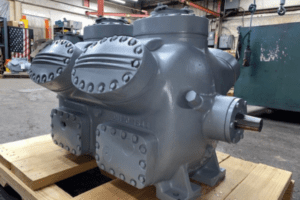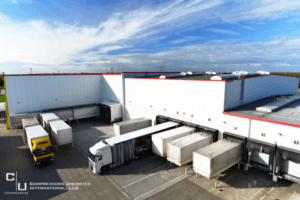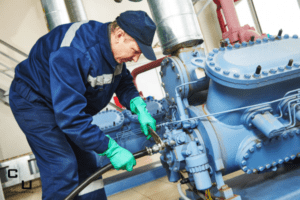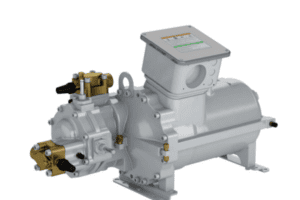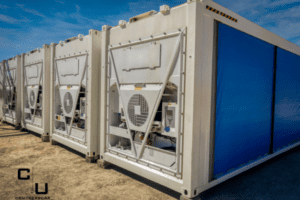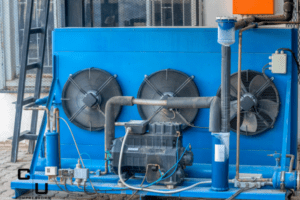There are many facilities out there that rely on their cooling systems to function. High-level commercial and industrial cooling systems can be found in lots of different industries. In every case, the compressor is essential. But nowhere can more money be lost faster than in a database center.
Database centers enable technology companies to provide their services around the world. In today’s “cloud” landscape, the distributed environment still depends on backbone servers. These servers are also used for design and development. They must be kept in the perfect operating environment.
One of the biggest challenges in planning any database center is waste heat. Database computers are often racked together for efficient use of space and ease of maintenance. Each one has the potential to put out an enormous amount of waste heat. Left to themselves, the full racks can feel like ovens.
Naturally, all this sensitive equipment would fail in minutes without a carefully considered cooling system.
And that cooling function relies on having the best HVAC commercial compressor for the job from the very start.
How Hot Do Database Servers Get? The Energy Equation More Businesses Struggle With
The CPU in a high-performance piece of computer hardware can run up to 150°F and still be considered in the normal range. A temperature of 176°F during a heavier workload is worth keeping an eye on, but still not out of the question. Heat is absorbed by internal heat sinks and, often, water cooling systems.
While there’s a range of opinions on the ideal temperature for a database center, the argument often comes down to a pragmatic dilemma: Colder is better, but cold temperatures can raise costs. In 2021, ASHRAE released new thermal guidelines for data processing environments to weigh in on the matter.
ASHRAE recommends the temperature not be lower than 15°C (that is, 59°F). While it’s true that the maximum temperature in the specification is a sweltering 89.6°F, server benchmarking under a wide range of operating conditions consistently shows colder is better for most hardware.
At the same time, it’s understandable why so many organizations are becoming concerned about the sheer amount of electricity used in cooling today’s database centers. The typical data center yields an energy usage of about 1,000 kWh per square meter.
At a time when more enterprises are making major environmental commitments or even pledging to go carbon neutral, everyone is looking at ways to control those costs – without turning the sensitive silicon of the server room into paste. A good HVAC compressor may just help you square the circle.
The Right Commercial HVAC Compressor Helps Maintain Excellent Performance at Lower Costs
While there are many design factors for any database center, even the best layout won’t work unless the airflow and temperature goals are supported by a premium commercial HVAC compressor. Your HVAC compressor is the heart of your system and determines many performance characteristics.
The compressor is responsible for circulating refrigerant gas so it is available to the rest of the system. It is the core of the refrigeration cycle. Choosing the right one is the key to protecting your critical systems.
What many facilities leaders don’t realize is that you can reduce the cost of cooling while maintaining an excellent standard by following the right maintenance plan for your compressor. No matter the make or model of compressor, it’s sure to have weekly, monthly, quarterly, and annual needs.
Once you’ve selected and implemented a compressor, you will generally maintain the exact same make and model through the facility’s life. However, many database centers need multiple compressors that work together to achieve their goals – and it is always possible to improve efficiency.
In addition to regular maintenance, it’s vital to keep an eye on HVAC system output and costs. If a performance issue strikes, it’s often not traceable to the compressor itself, but another component. For example, your smart thermostat may need calibration or sensors might need to be cleaned off.
What to Do When You Need to Replace a Database Center Compressor
Sooner or later, you’ll need to replace a compressor in your database center. Planning and forethought are crucial to ensure you can do it in a way that reduces disruption to technical services and customers.
What’s the fastest and least expensive way to get a replacement commercial HVAC compressor? Use a remanufactured commercial compressor. A remanufactured unit means “like new” performance at a fraction of the cost. Just as importantly for a database center, you can get your unit much faster.
On top of significant savings and a turnaround time of days rather than months, the relationship with a compressor remanufacturing team can help you get the best performance from your unit – with advice customized to your hardware and a ready source of high quality compressor spare parts.


